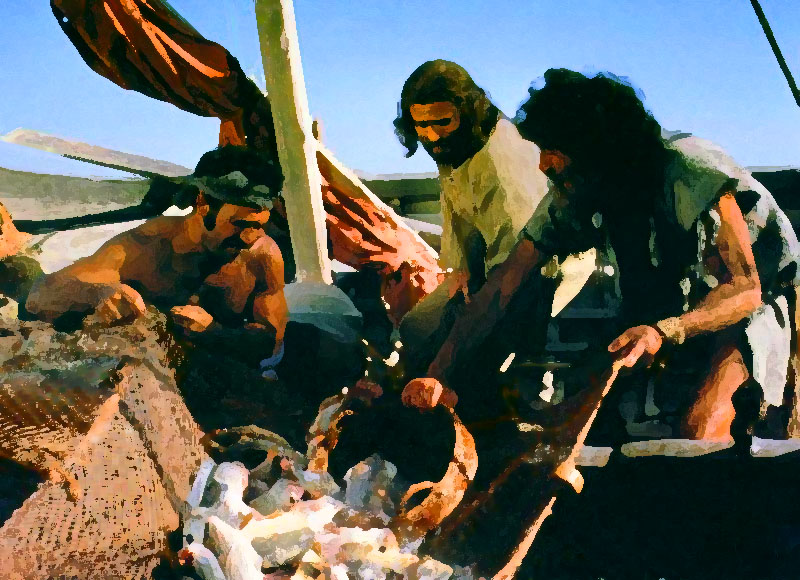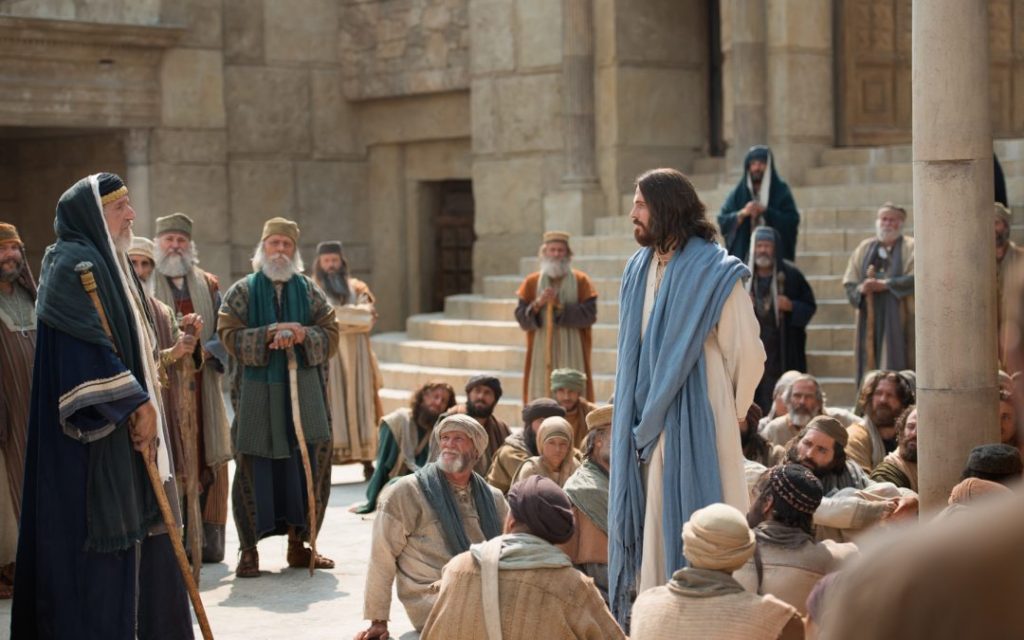 You either love it or hate it but The Office is one of the most successful TV comedy series of the 21stCentury. Called a ‘mockumentary’, it was filmed as a ‘fly-on-the-wall’ documentary and set in the offices of Wernham Hogg, a paper merchant in Slough. Written by Ricky Gervais and Stephen Merchant, The Office catapulted Gervais to stardom in 2001, winning two Golden Globes, one for his acting and one for the show itself. “The humour is very simple. It comes from observations about mundane office life, humour basically at the expense of all the different types of people working in the office.” (Jago Wynne). The characters are clearly stereotypes but if you have ever watched the programme I am sure you will have seen similarities with colleagues in real life. In fiction, it has all the ingredients necessary for an entertaining comedy series. In real life, it has all the ingredients for a perfect storm in your office, in your home, or indeed your church too.
You either love it or hate it but The Office is one of the most successful TV comedy series of the 21stCentury. Called a ‘mockumentary’, it was filmed as a ‘fly-on-the-wall’ documentary and set in the offices of Wernham Hogg, a paper merchant in Slough. Written by Ricky Gervais and Stephen Merchant, The Office catapulted Gervais to stardom in 2001, winning two Golden Globes, one for his acting and one for the show itself. “The humour is very simple. It comes from observations about mundane office life, humour basically at the expense of all the different types of people working in the office.” (Jago Wynne). The characters are clearly stereotypes but if you have ever watched the programme I am sure you will have seen similarities with colleagues in real life. In fiction, it has all the ingredients necessary for an entertaining comedy series. In real life, it has all the ingredients for a perfect storm in your office, in your home, or indeed your church too.
Category Archives: Theology
Feeling God’s Pleasure
 In 1943, Li Airui found himself imprisoned by the Japanese in the Weihsien internment camp in Shandong, Northern China. Li quickly emerged as a leader among the 1800 internees.
In 1943, Li Airui found himself imprisoned by the Japanese in the Weihsien internment camp in Shandong, Northern China. Li quickly emerged as a leader among the 1800 internees.
Life in the camp was hard, under a brutal regime. Some oil company executives, managed to bribe the guards into receiving extra rations and luxuries. Li shamed them into sharing these with the other prisoners. Without the benefit of equipment or supplies, Li taught science to the children in a makeshift school. He led Bible studies, taught Sunday school and cared for the sick and elderly. Li organized games to promote fitness and boost morale. That is perhaps not surprising because Li was the first Chinese person ever to win a gold medal in the Olympics.
The Final Frontier
 I’ve been thinking a lot about my future recently. Maybe its because I ‘celebrated’ (if that is the right word) my 65th birthday at the weekend. I’ve come to the conclusion that the biggest divide in the world in not between life and death but between our perceptions of life and death. The apostle Paul in his first letter to the church in Thessalonica writes,
I’ve been thinking a lot about my future recently. Maybe its because I ‘celebrated’ (if that is the right word) my 65th birthday at the weekend. I’ve come to the conclusion that the biggest divide in the world in not between life and death but between our perceptions of life and death. The apostle Paul in his first letter to the church in Thessalonica writes,
“Brothers and sisters, we do not want you to be uninformed about those who sleep in death, so that you do not grieve like the rest of mankind, who have no hope.” (1 Thessalonians 4:13).
What is the simplest way of distinguishing those who have hope and those who do not? I believe it has to do with how we view death and loved one who have died. Do we refer to them in the past tense or in the present tense? Continue reading
Jesus is the New Moses
 Apart from the resurrection of Jesus, the feeding of the 5,000 is the only other miracle recorded by all four gospels. This suggests it has some significance. Not least because of the numbers who witnessed and, indeed, participated in it. Perhaps this is why the story is so well known today. Or is it? Lets test you. How many were fed that day? We are told by Mark that the number of men who had eaten was 5,000. What about the women and children? A conservative estimate would actually put the figure closer to 10,000 or more. But there is more to this miracle than numbers. What was the context? What is the conundrum? What were the consequences? Lets begin with the context.
Apart from the resurrection of Jesus, the feeding of the 5,000 is the only other miracle recorded by all four gospels. This suggests it has some significance. Not least because of the numbers who witnessed and, indeed, participated in it. Perhaps this is why the story is so well known today. Or is it? Lets test you. How many were fed that day? We are told by Mark that the number of men who had eaten was 5,000. What about the women and children? A conservative estimate would actually put the figure closer to 10,000 or more. But there is more to this miracle than numbers. What was the context? What is the conundrum? What were the consequences? Lets begin with the context.
Three Kinds of Faith in Jesus
 Three questions: The Beaufort scale measures…. wind speed. The Richter scale measures…. earthquakes. The Engels scale measures… faith. That’s right – faith. The Engel scale was developed by James F. Engel, as a way of representing the journey from no knowledge of God, through to spiritual maturity as a Christian believer.
Three questions: The Beaufort scale measures…. wind speed. The Richter scale measures…. earthquakes. The Engels scale measures… faith. That’s right – faith. The Engel scale was developed by James F. Engel, as a way of representing the journey from no knowledge of God, through to spiritual maturity as a Christian believer.
Everyone in the world, and everyone who has ever lived, is somewhere on the Engel’s scale.The Engel’s scale is helpful in identifying where people are in their spiritual journey and how best to help lead them to Jesus Christ. Continue reading
How Can I Overcome Failure?
 I wonder what you consider to have been the biggest business failure of all time? Toys R Us? Poundworld? Blockbuster? HMV? Jessops? Comet? Remember Habitat or Oddbins? And I forgot Readers Digest, MFI, Woolworths, Homebase, Poloroid and or course, MG Rover. But the biggest failure? Or perhaps rather the company with the greatest number of failures? How about Dyson? If Hoover became synonymous with the vacuum cleaner, Dyson has become synonymous with… the dual cyclone, bagless, vacuum cleaner, the bladeless fans, the uniball wheelbarrow, the quickest, most efficient hand driers in the world, the most powerful and lightest rechargeable vacuum cleaner and … probably the greatest number of failures in the world as well. Check their website out and they admit they are failures – indeed they are proud of it:
I wonder what you consider to have been the biggest business failure of all time? Toys R Us? Poundworld? Blockbuster? HMV? Jessops? Comet? Remember Habitat or Oddbins? And I forgot Readers Digest, MFI, Woolworths, Homebase, Poloroid and or course, MG Rover. But the biggest failure? Or perhaps rather the company with the greatest number of failures? How about Dyson? If Hoover became synonymous with the vacuum cleaner, Dyson has become synonymous with… the dual cyclone, bagless, vacuum cleaner, the bladeless fans, the uniball wheelbarrow, the quickest, most efficient hand driers in the world, the most powerful and lightest rechargeable vacuum cleaner and … probably the greatest number of failures in the world as well. Check their website out and they admit they are failures – indeed they are proud of it:
“Most people think testing is all about durability and reliability. Of course that’s a big part of it. But before that happens – before you even have something to beat the hell out of – you need an idea that works. Dyson engineers get those ideas often by trying the ridiculous. Most of the time it ends in failure. That’s good. Failure sparks thinking and the extraordinary.”
How to Develop an Umbrella Faith

A small farming village was threatened with drought because the rains had failed to arrive. On a hot and dry Sunday, the pastor told his congregation, “There isn’t anything that will save us except to pray for rain. Go home, pray, believe, and come back next Sunday ready to thank God for sending rain.” The people returned to church the following Sunday. As they sat down the Pastor gently rebuked them. “We can’t worship today because you do not yet believe,” he said. “But we prayed” they protested, “and we do believe.” “Believe?” he responded. “Then where are your umbrellas?” Faith is made visible by our actions. So let me ask you this morning “Where are your umbrellas?” Do you have umbrella faith?
Jesus and your Confirmation Bias
 Bertrand Russell once said, “Most people would rather die than think; in fact, they do so.” A recent research study at the University of Iowa, seems to confirm that. Researchers found that people are reluctant to change their minds and adapt their views, even when new information has been presented. This holds true even if they stand to lose money.
Bertrand Russell once said, “Most people would rather die than think; in fact, they do so.” A recent research study at the University of Iowa, seems to confirm that. Researchers found that people are reluctant to change their minds and adapt their views, even when new information has been presented. This holds true even if they stand to lose money.
The phenomenon is called “confirmation bias” and apparently operates at a subconscious level at all times. The new research confirms numerous previous studies which show people invariably stick to their original viewpoint even when new facts contradict those beliefs. When faced with facts that don’t fit, we tend to ignore or change them to fit our beliefs.[1]
In our gospel reading this morning, Mark 3:20-35, we see confirmation bias at work. Faced with the same facts, people reach very different conclusions about Jesus. Continue reading
Jesus the Peacemaker
 “Treacherous colleagues, competitive friends, bloody-minded commuters – it’s a war out there. And according to Robert Greene, it’s a conflict we’re ill-equipped to deal with. After analysing the moves of history’s great military leaders, he’s written a rulebook to achieving victory in life’s daily battles.”[1]
“Treacherous colleagues, competitive friends, bloody-minded commuters – it’s a war out there. And according to Robert Greene, it’s a conflict we’re ill-equipped to deal with. After analysing the moves of history’s great military leaders, he’s written a rulebook to achieving victory in life’s daily battles.”[1]
Spanning world civilizations, synthesizing dozens of political, philosophical, and religious texts and thousands of years of violent conflict, The 33 Strategies of War is a comprehensive guide to the subtle social game of everyday life informed by the most ingenious and effective military principles in war. Abundantly illustrated with examples from history, including the folly and genius of everyone from Napoleon Bonaparte to Margaret Thatcher, from Shaka the Zulu to Lord Nelson, and from Hannibal to Ulysses S. Grant, each of the thirty-three chapters outlines a strategy that will help you win life’s wars. Learn the offensive strategies that require you to maintain the initiative and negotiate from a position of strength, or the defensive strategies designed to help you respond to dangerous situations and avoid unwinnable wars.[2] Continue reading
Lord, Teach us to Pray
 I wonder if you are old enough to remember the early Beatles hit, “Help”? How do the lyrics go? “Help. I need somebody. Help. Not just anybody. Help. You know I need someone. Help!” Some people view prayer that way. They only call on God when they have a problem.
I wonder if you are old enough to remember the early Beatles hit, “Help”? How do the lyrics go? “Help. I need somebody. Help. Not just anybody. Help. You know I need someone. Help!” Some people view prayer that way. They only call on God when they have a problem.
Corrie ten Boom, knew the importance of prayer. She once asked the question, “Is prayer your steering wheel or your spare tyre?” While your car has both, they have very different purposes. When you are driving, your need to keep your hands on the steering wheel at all times.
The steering wheel allows you to navigate and gets you to your destination safely. But the spare tyre plays a secondary role. You may never have touched the spare tyre in your car. You may not even know where it is. It is probably new and unused because it is only needed in case of an emergency.

How is your prayer life defined by this question? Is prayer like your steering wheel or a spare tyre? Does your prayer life guide you in every facet of your life? Is it something you have your hands on every waking moment of the day? Or is it like a spare tire, something you only use in times of emergency? For most of the day you forget that it’s there. You’re not even sure how to use it and find yourself struggling when you need to use it. Continue reading
